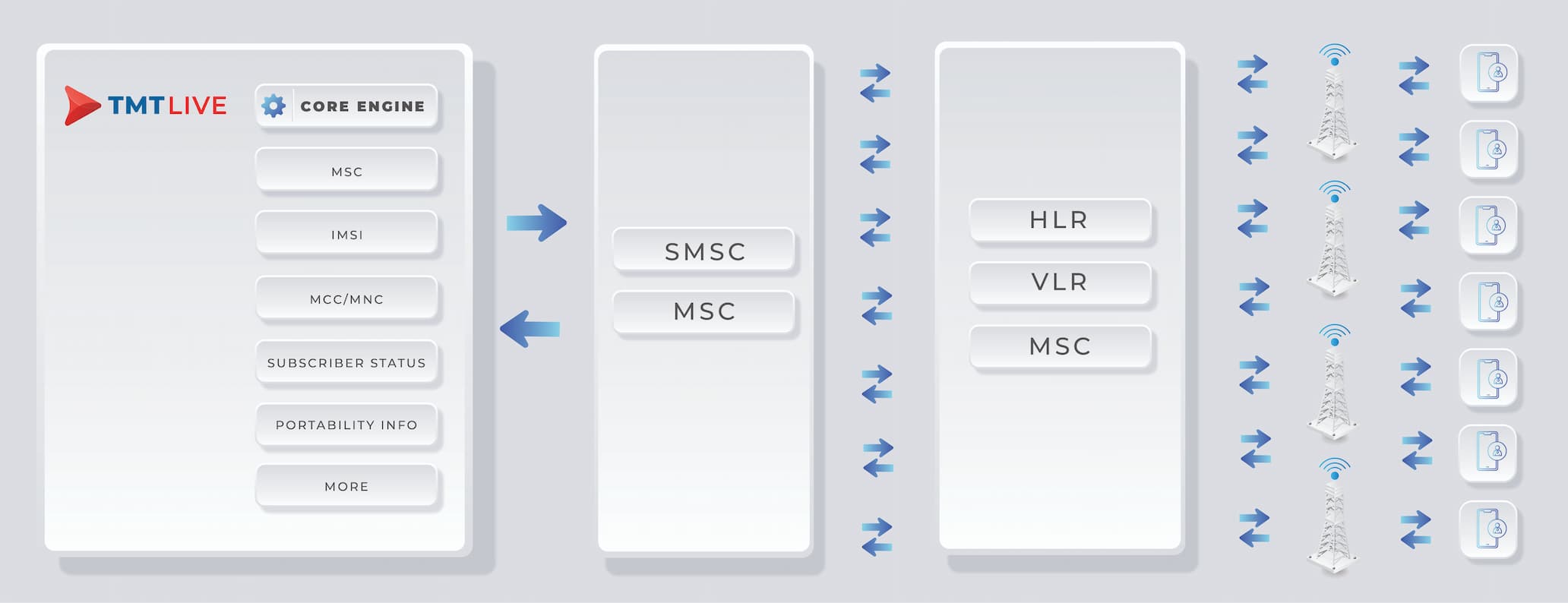
HLR stands for Home Location Register, which is a database used in mobile networks to store subscriber information. This includes the subscriber’s home network, phone number, and other important details about them. It is used to route calls and texts to the correct mobile network and to authenticate subscribers when they try to access network services.
When a user turns on their mobile device, it then registers with the HLR of the network it is currently connected to. This allows the network to route calls and texts to the device in question.
HLR lookups, also known as HLR inquiries or HLR checks, are used to verify the status of a mobile phone number and to retrieve information about the subscriber associated with the mobile phone number.
This can be useful for a variety of purposes, such as verifying that a phone number is valid, is in use and determining the location or network of a mobile phone. This information can also be used to help identify if a customer is active and real, by checking their provided information against the HLR database.
HLR lookups are generally restricted to authorised parties, such as mobile network operators and authorised platforms which have access to the trusted global data sources – provided by network operators or government agencies dependent on country.

HLR lookups can be used by a wide range of businesses to perform data cleansing on a list of customer mobile phone numbers. This is done by verifying the validity and status of each number before sending out text communications or authorisation codes. This can be useful for a variety of purposes, such as identifying and removing invalid or inactive numbers from the list or determining the location and network of the mobile phones associated with the numbers.
To perform data cleansing using enterprise HLR lookups, a request is sent to the Home Location Register of the mobile network associated with each phone number in the list. The HLR contains information about all subscribers registered with the network. When the HLR receives the request, it searches its database for the phone number and returns the corresponding subscriber information to the requester.
Using the information returned, it is possible to determine the validity and status of each phone number on the list. Invalid or inactive numbers can be identified and removed, while active numbers can be used for ongoing communications. This has a number of benefits such as reduced costs for sending messages to only active numbers and more accurate customer information.
An active number status check is a process of determining whether a telephone number is currently in service and able to receive calls or messages. These lookups can be used to check the active status of a mobile phone number by verifying that the number is registered with a mobile network and can receive calls and texts.
If the HLR returns valid subscriber information for the phone number, it indicates that the number is active and registered with the network. If the HLR does not return any information, or if this data confirms that the number is not registered with the network, it is inactive or invalid.
Undertaking frequent lookups can provide several benefits to a wide range of businesses who handle large amounts of mobile number data. These include:
Increased profitability: they help your business optimise your marketing lists, covering both historic data and new customers alike. Utilising SMS HLR lookups and bulk hlr lookups to identify inactive numbers you can save money on the costs associated with sending SMS text messages in bulk.
Enhanced Data Accuracy: by getting real-time information about the status of mobile phone numbers, including whether they are active, roaming, or ported. This helps in maintaining accurate customer databases, reducing data errors, and improving the overall quality of customer information.
Elimination of Fraudulent Account Creation: When customers are signing up online via your website, HLR lookup services can be used to validate the number provided by your customers through your form submissions, reducing the need for two factor authentication and added friction during your online customer onboarding process. This can also help businesses which operate in regulated industries, who have to meet ongoing Know Your Customer (KYC) requirements.
Optimisation of your call handling processes: If you are a business who handles a large volume of calls, such as a call centre or public sector agency, you can use these to effectively route your calls. Through directing this via networks which offer lower fees significant reductions can be made to your overall call costs.
Compliance with Regulations: By verifying the accuracy of contact details, HLR lookups aid businesses in complying with data protection and privacy regulations. They ensure that businesses reach out to the correct individuals and maintain the privacy and security of sensitive information.
To provide the most comprehensive cover we can we use a combination of high quality HLR providers together with our own Signalling System 7 (SS7) infrastructure. Our support team are constantly testing and optimising this routing to deliver the best mix of performance, coverage and cost.
The costs you should be paying is variable for a few reasons which relate to the nature of your request. It has become much more flexible to access HLR checks online, which can be undertaken on either a pay as you go basis or as part of a managed subscription – integrated into your existing processes via our Live API. Some other considerations that impact fees also include:
There are also a range of checks you can undertake, so unless your well versed, there can be benefits in working with a managed provider to make sure your validating your data in the most optimal way. We’ve published a guide on the different types of number lookup to make sure you’re getting the right information returned.
A HLR lookup works through an API connection by querying a mobile carrier’s HLR database for information about a specific mobile phone number. This query requests information such as whether the phone number is active or inactive, the carrier associated with the number, the roaming status of the number, and the country of origin of the phone number.
The API connection sends the query to our database which processes the request and provides a response. Depending on the specific API used, the user may receive the response in real-time or as a batch request.
Our API connection makes it easy for businesses to access real-time mobile phone information in their software. By integrating an HLR lookup API into their own software services, businesses can automatically receive information about mobile phone numbers when needed.
Home Location Registry or HLR lookups are a very accurate way of determining key attributes about a number, such as whether it is active, roaming etc. HLR information is both accurate and updated in real-time since it is essential for the correct operation of the global telephony network, allowing operators to exchange information on subscriber status to facilitate the completion of calls or delivery of messages. However, HLR cannot be considered as one single homogenous platform, since it is distributed across all of the major mobile operators World-wide. For obvious reasons, these operators will often take measures to limit HLR access for certain countries and use cases which means that HLR coverage cannot be guaranteed for all operators. TMT ID have a dedicated traffic management team and work with multiple suppliers to ensure that our HLR coverage is as comprehensive as possible, ensuring as many customers as possible can make use of this valuable resource.
Businesses employing HLR lookup services must recognise the potential legal and regulatory implications linked with their usage. Depending on the jurisdiction and the specific application, businesses may be obligated to adhere to laws concerning data privacy, telecommunications, and consumer protection. It’s crucial to ensure that the utilisation of HLR lookup services aligns with applicable laws and regulations, which includes securing consent from individuals whose phone numbers are being queried and safeguarding the confidentiality of any acquired data.
When selecting a provider for HLR lookup services, businesses should consider several factors to ensure they choose a reliable and reputable provider. Additionally, businesses should evaluate the provider’s reliability and uptime, as well as the speed and responsiveness of their lookup service. Conducting thorough research and obtaining recommendations from trusted sources can help businesses make informed decisions when selecting an HLR lookup service provider.
There is a good deal of terminology within the HLR lookup sector therefore we have outlined the key phrases and abbreviations associated with mobile networks and the Home Location Register database:
Cellsite: A physical location where mobile network infrastructure, such as antennas and base stations, is installed to provide wireless coverage to a specific geographic area.
Equipment Identity Register (EIR): A database used in mobile networks to store information about mobile devices, including the MEI and other details.
Location Area Identity (LAI): A code that identifies a specific location area within a mobile network. A location area is a group of cellsites that share a common LAI.
International Mobile Subscriber Identity (IMSI): A unique identifier assigned to each mobile subscriber that consists of the MCC, MNC, and a unique subscriber number.
Know Your Customer (KYC): A set of procedures and guidelines that financial institutions and other regulated entities must follow in order to verify the identity of their customers and assess any potential money laundering or terrorist financing risks.
Mobile country code (MCC): A three-digit code assigned by the International Telecommunication Union (ITU) to identify a country or territory for the purpose of numbering mobile phones.
Mobile device: A portable device, such as a smartphone or tablet, that is capable of connecting to a mobile network.
Mobile Equipment Identity (MEI): A unique identifier assigned to each mobile device.
Mobile network: A network of cellsites and associated infrastructure that provides wireless communication services to mobile devices.
Mobile network code (MNC): A two- or three-digit code assigned by the ITU to identify a specific mobile network operator within a country or territory.
Mobile network operator (MNO): A company that owns and operates a mobile network and sells mobile network services to subscribers.
Mobile Subscriber Integrated Services Digital Network Number (MSISDN): The phone number of a mobile device, which consists of the country code, area code, and local number.
Subscriber: A person or organisation that has a contract with a mobile network operator to use the operator’s mobile network services.
Visitor Location Register (VLR): A database used in mobile networks to store temporary subscriber information for subscribers who are visiting a different network.
Last updated on June 19, 2025



Our Live, Velocity & TeleShield Routing service can be used not only through standard API integration, but through our online customer portal as a pay-as-you-go service called Viteza. Our Viteza portal enables you to sign-up to begin querying numbers in a matter of minutes
Utilise your 500 free queriesWe provide the most comprehensive device, network and mobile numbering data available
Contact us > Chat to an expert >